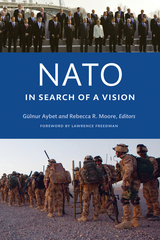
As the NATO Alliance enters its seventh decade, it finds itself involved in an array of military missions ranging from Afghanistan to Kosovo to Sudan. It also stands at the center of a host of regional and global partnerships. Yet, NATO has still to articulate a grand strategic vision designed to determine how, when, and where its capabilities should be used, the values underpinning its new missions, and its relationship to other international actors such as the European Union and the United Nations.
The drafting of a new strategic concept, begun during NATO’s 60th anniversary summit, presents an opportunity to shape a new transatlantic vision that is anchored in the liberal democratic principles so crucial to NATO’s successes during its Cold War years. Furthermore, that vision should be focused on equipping the Alliance to anticipate and address the increasingly global and less predictable threats of the post-9/11 world.
This volume brings together scholars and policy experts from both sides of the Atlantic to examine the key issues that NATO must address in formulating a new strategic vision. With thoughtful and reasoned analysis, it offers both an assessment of NATO’s recent evolution and an analysis of where the Alliance must go if it is to remain relevant in the twenty-first century.

NATO’s 2010 Strategic Concept officially broadened the alliance’s mission beyond collective defense, reflecting a peaceful Europe and changes in alliance activities. NATO had become an international security facilitator, a crisis-manager even outside Europe, and a liberal democratic club as much as a mutual-defense organization. However, Russia’s re-entry into great power politics has changed NATO’s strategic calculus.
Russia’s aggressive annexation of Crimea in 2014 and its ongoing military support for Ukrainian separatists dramatically altered the strategic environment and called into question the liberal European security order. States bordering Russia, many of which are now NATO members, are worried, and the alliance is divided over assessments of Russia’s behavior. Against the backdrop of Russia’s new assertiveness, an international group of scholars examines a broad range of issues in the interest of not only explaining recent alliance developments but also making recommendations about critical choices confronting the NATO allies. While a renewed emphasis on collective defense is clearly a priority, this volume’s contributors caution against an overcorrection, which would leave the alliance too inwardly focused, play into Russia’s hand, and exacerbate regional fault lines always just below the surface at NATO. This volume places rapid-fire events in theoretical perspective and will be useful to foreign policy students, scholars, and practitioners alike.
READERS
Browse our collection.
PUBLISHERS
See BiblioVault's publisher services.
STUDENT SERVICES
Files for college accessibility offices.
UChicago Accessibility Resources
home | accessibility | search | about | contact us
BiblioVault ® 2001 - 2024
The University of Chicago Press









